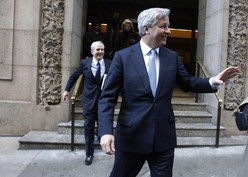CEO of JPMorgan to testify before US senate panel
US Senate Committee on banking will soon be examining whether JPMorgan Chase Co. violated rules requiring the bank to publicly and timely disclose material changes in trading, after it reported losses of at least $2 billion in credit derivatives on May 10.

"I intend to call JPMorgan's CEO Jamie Dimon to testify before the Committee. In calling for Mr. Dimon to testify, I expect him to inform the Committee of the details surrounding what has been reported to be a very complex trade," said Senate Banking Committee Chairman Tim Johnson, chairing a hearing on the implementation of derivatives provisions in the Wall Street Reform Act.
The probe is expected to help the senate reach a better and more complete understanding of the facts about the JPMorgan matter" to help in better overseeing the implementation of Wall Street reform, Johnson stated.
Speaking during a hearing from SEC Chairman Mary Schapiro and CFTC Chairman Gary Gensler on the implementation of derivatives provisions in the Wall Street Reform Act, Johnson said the JPMorgan "trading loss has been a wake-up call for many opponents of Wall Street reform and the need to fully fund the agencies responsible for overseeing the swap trades that appear to be at the core of the firm's hedging strategy."
He expressed hope that those alarmed by the developments will support Democrats in advocating full funding for the regulatory "cops on the beat" to address the very issues that some now suddenly seem so concerned about.
Johnson also urged the regulators to take a single, unified approach to regulating cross-border transactions, "and to integrate this approach into all your swap rules. Differences between your two sets of rules and implementation efforts should be minimized to improve compliance and limit costs."
Currently, efforts by the US to promote harmonization abroad are facing challenges, which will be more challenging if we cannot harmonize efforts by our agencies here at home," Johnson warned.
Speaking at the hearing, Securities and Exchange Commission Chairman Mary Schapiro disclosed, "We're investigating right now whether their earnings statements and first-quarter financial reports are accurate and truthful."
JPMorgan first disclosed the losses, which emanated from the bank's London office, in a May 10 conference call with analysts.
The hearing comes as JPMorgan shares gained roughly 5% in midday trading.
Both Schapiro and Gensler told lawmakers they were not aware of the trading losses at JPMorgan until they learned about them it in press reports. The SEC chief noted that since the activity took place in the London branch, the agency did not have any "direct oversight or knowledge of the transactions."
In addition to the SEC, the CFTC and Federal Bureau of Investigation are all investigating the trading.
Both Schapiro and Gensler also added that new regulation being implemented as part of the Dodd-Frank Act written in response to the financial crisis of 2008 will help the agencies oversee and limit similar big losses at large banks in the future. JPMorgan did not return requests for comment about the timing of the firm's disclosures.
Schapiro said that the SEC would have had a much better understanding of the situation if the Dodd-Frank rules had been in place before the losses took place.
Had the rules been in place, Schapiro said, "There would have been detailed transparency to regulators and the public."
Gensler noted that over the next few months banks will be required to register as swaps dealers with the agency and be subject to additional oversight.
The lawmakers also voiced concerns about the effectiveness of a requirement that banks use their own internal models to determine how much capital they should have for their trading books.
Companies are required to publicly disclose quantitative information about market risk, and most use a so-called "value at risk" model in their SEC filings to meet that requirement.
Schapiro said the VAR estimates are intended to identify the potential possible decline in value of a position or portfolio under normal market conditions.
She however pointed out that the disclosure has a weakness because it doesn't measure the maximum possible losses in a portfolio that could be incurred during very stressed market conditions.
"It has its limitations," she remarked.
Source: United States News.Net
- 509 reads
Human Rights
Fostering a More Humane World: The 28th Eurasian Economic Summi

Conscience, Hope, and Action: Keys to Global Peace and Sustainability

Ringing FOWPAL’s Peace Bell for the World:Nobel Peace Prize Laureates’ Visions and Actions

Protecting the World’s Cultural Diversity for a Sustainable Future

Puppet Show I International Friendship Day 2020

